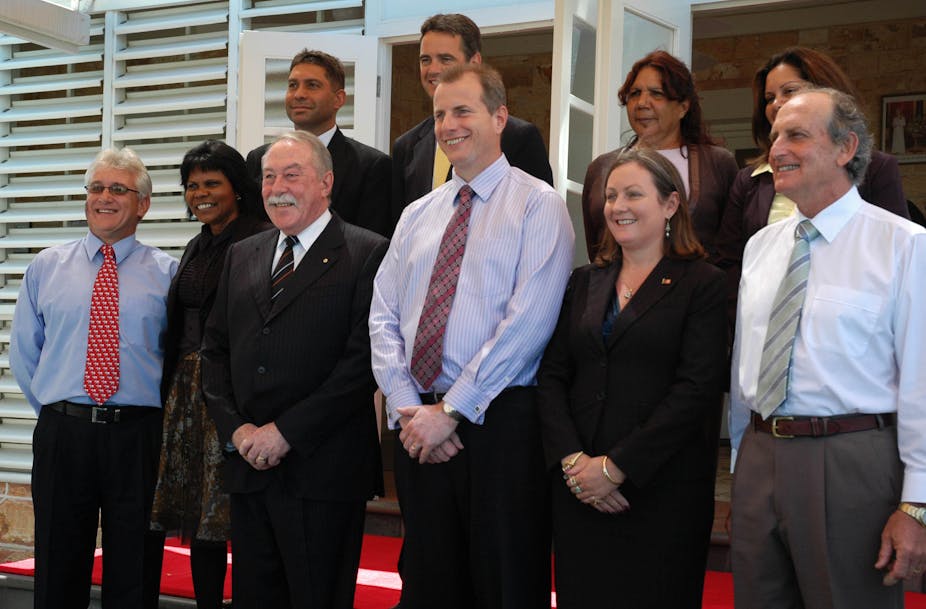The news that the three “rebel” Indigenous members of the NT Legislative Assembly had joined the Palmer United Party (PUP) has created national interest as well as a considerable stir in the Northern Territory.
On The Conversation, Michelle Grattan regarded last weekend’s move as a win for party leader Clive Palmer. Other national media interpreted it in the vein of Palmer’s eccentric celebrity, a whim in his quest for publicity. The NT media has been cautious, seeing this as the latest manoeuvre of a supposedly erratic Alison Anderson, the leader of the three Indigenous MLAs who recently left the Country Liberal Party government.
Queensland Premier Campbell Newman (in a press conference with Prime Minister Tony Abbott) asked whether the three MLAs had been offered inducements of money or jobs, ignoring the fact that all three have jobs and will probably keep them at the next NT election. Newman’s comments missed the point. The MLAs approached Palmer, not the other way around. And they did this out of shrewd calculation.
When the three MLAs left the Country Liberal government they originally intended to form a party to focus upon properly representing Aboriginal interests. They discovered this was going to be difficult without access to money and administrative resources.
As a group they were not eligible for the extra resources that attach to being an official party (a party requires four MLAs in the NT Assembly to qualify). As such, their prospects of developing an electoral machine that could conceivably win seats, other than their own, were slight. They were threatened with marginalisation.
Speaking to local ABC radio, Anderson was candid about their reasons for joining the PUP. They needed financial support, access to a serious party platform and administrative assistance. The fact that the three MLAs are now going to have financial and administrative assistance has important ramifications for politics, not just in the NT but nationally.
Impacts both regional and national
This development will have three major impacts.
Firstly, it will solidify the Aboriginal vote in the NT.
Anderson and her confreres are being dismissed by the two major parties. After the recent Blain by-election, which the Country Liberal Party (CLP) won to retain a workable majority in the NT Assembly, NT Chief Minister Adam Giles has been insistent that Anderson is irrelevant. But this misses the point.
The Aboriginal interest is becoming a solid constituency. It began to desert Labor in the 2010 federal election and voted conservative for the first time in the 2012 NT election, sweeping the Country Liberals to a surprise victory. In the seat of Lingiari in the last federal election, despite the national landslide to the Coalition, Aborigines returned their votes to Labor and enabled Labor’s Warren Snowdon to snatch a surprising victory.
The three new PUP members understand that for the better part of 25 years, successive NT governments have diverted Commonwealth general purpose grants “earned” by Aboriginal disadvantage to pork-barrelling in Darwin. Aboriginal people are beginning to understand that and are becoming hostile to governments of both persuasions that ignore their interests.
Each government can, in future, expect Aboriginal electoral hostility. The PUP members will articulate the grievances of that constituency. This growing Aboriginal firmness about their rights and entitlements presents a considerable moral challenge, not just for the NT but for the nation.
Secondly, properly financed and organised, the PUP will not only win the three seats of its current MLAs but probably the two other “bush” seats held by the CLP.

So, barring an unlikely landslide to either of the major parties, the PUP will hold the balance of power after the next NT election in 2016. That will mean the PUP decides which of the major parties governs.
Finally, the expansion of the PUP to include an Aboriginal interest may potentially be a gamechanger at the national level.
After June, the PUP (plus a Australia Motoring Enthusiasts Party senator) will form part of the balance of power in the federal Senate. The NT’s Aboriginal MLAs have the opportunity indirectly to press Aboriginal interests in the Senate. This may have interesting consequences for a federal Coalition government seemingly committed to cutting funding for many Indigenous programs.
It is understandable that three disaffected Aboriginal MLAs joining the PUP may generally be regarded as some regional oddity. But this may have a potential impact on politics as great as the advent of the Democrats in the 1970s and the Greens in the 1980s, albeit with a regional and Indigenous tinge.
We may be seeing the birth of a new third force in Australian politics. We should remember that at the next federal election, the PUP will have public electoral funding and be less dependent on Palmer to fund its future.

